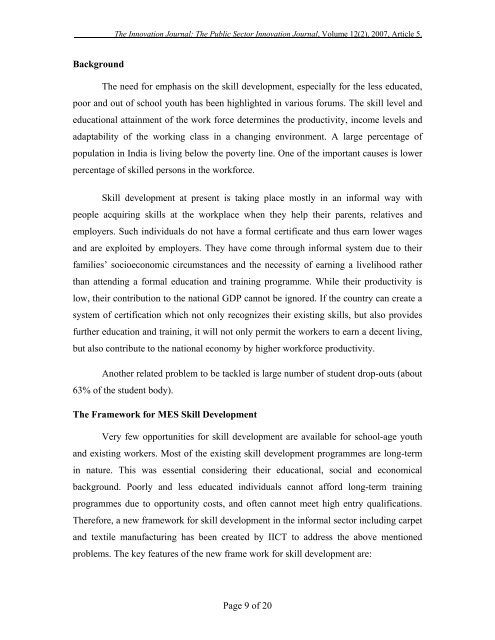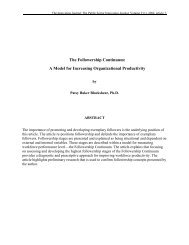Handmade Carpets: - The Innovation Journal
Handmade Carpets: - The Innovation Journal
Handmade Carpets: - The Innovation Journal
You also want an ePaper? Increase the reach of your titles
YUMPU automatically turns print PDFs into web optimized ePapers that Google loves.
<strong>The</strong> <strong>Innovation</strong> <strong>Journal</strong>: <strong>The</strong> Public Sector <strong>Innovation</strong> <strong>Journal</strong>, Volume 12(2), 2007, Article 5.<br />
Background<br />
<strong>The</strong> need for emphasis on the skill development, especially for the less educated,<br />
poor and out of school youth has been highlighted in various forums. <strong>The</strong> skill level and<br />
educational attainment of the work force determines the productivity, income levels and<br />
adaptability of the working class in a changing environment. A large percentage of<br />
population in India is living below the poverty line. One of the important causes is lower<br />
percentage of skilled persons in the workforce.<br />
Skill development at present is taking place mostly in an informal way with<br />
people acquiring skills at the workplace when they help their parents, relatives and<br />
employers. Such individuals do not have a formal certificate and thus earn lower wages<br />
and are exploited by employers. <strong>The</strong>y have come through informal system due to their<br />
families’ socioeconomic circumstances and the necessity of earning a livelihood rather<br />
than attending a formal education and training programme. While their productivity is<br />
low, their contribution to the national GDP cannot be ignored. If the country can create a<br />
system of certification which not only recognizes their existing skills, but also provides<br />
further education and training, it will not only permit the workers to earn a decent living,<br />
but also contribute to the national economy by higher workforce productivity.<br />
Another related problem to be tackled is large number of student drop-outs (about<br />
63% of the student body).<br />
<strong>The</strong> Framework for MES Skill Development<br />
Very few opportunities for skill development are available for school-age youth<br />
and existing workers. Most of the existing skill development programmes are long-term<br />
in nature. This was essential considering their educational, social and economical<br />
background. Poorly and less educated individuals cannot afford long-term training<br />
programmes due to opportunity costs, and often cannot meet high entry qualifications.<br />
<strong>The</strong>refore, a new framework for skill development in the informal sector including carpet<br />
and textile manufacturing has been created by IICT to address the above mentioned<br />
problems. <strong>The</strong> key features of the new frame work for skill development are:<br />
Page 9 of 20
















